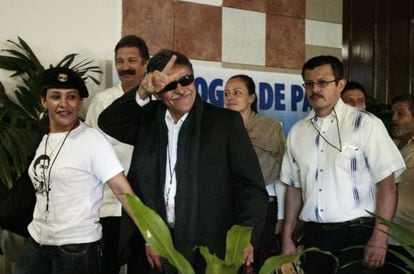Colombia wary of FARC ceasefire
Rebels meeting in Havana for peace talks say discussions are "on the right track"

The Colombian government said Tuesday that it was being cautious about a ceasefire announcement from FARC guerrillas, as both sides work in Havana to iron out a peace plan to end the nearly 50-year-old insurgency war.
Defense Minister Juan Carlos Pinzón said it would be difficult to verify whether the FARC (Revolutionary Armed Forces of Colombia) would honor the two-month ceasefire, which guerrilla officials in Cuba on Monday pledged to adhere to.
"Let's hope they comply with it," Pinzón said in a radio interview. "For years I have been hearing promises, hearing offers, and every time we hear them say something we discover more of their lies. It is difficult to believe them."
FARC leader Iván Márquez announced a cessation of hostilities starting at midnight Monday until January 20, 2013 as a gesture of good faith, while both the rebels and government officials try to hammer out a peace deal in Havana.
Peace talks are being mediated by Norway, Chile, Venezuela and Cuba
Jesús Santrich, a member of the FARC's military command, and whose real name is Seuxis Paucias Hernández Solarte, told reporters on Tuesday that the closed-door discussions were advancing at "a good pace."
"With the absolute conviction that the Colombian people will be victorious, I can tell you that we're moving ahead at a good pace - on the right track," he said as he arrived at Havana's Convention Palace, where the two sides are meeting.
The peace talks are being held in a piecemeal fashion. Currently, rural development is being discussed while thornier subjects - such as the political and legal future of the rebels, the drug trade and compensation for war victims - will be addressed at future dates. The dialogue is being mediated by Norway, Chile, Venezuela and Cuba.
Following the announcement of the break in hostilities, President Juan Manuel Santos made clear that the Colombian military wasn't going to stop its offensives against the guerrillas. The Santos government has dealt a series of bitter blows to the FARC in recent years, killing some of its top leaders in ambushes.
This is the third attempt to reach a peace deal with the drug-trafficking rebels since they formed back in 1964.
Once 30,000 strong, the insurgency only counts now on around 9,000 members.
Nicaragua gets more maritime rights
The International Court of Justice (ICJ) on Monday ruled that a cluster of small islands in the western Caribbean belongs to Colombia and not Nicaragua, as the Central American nation was claiming.
However, the court at The Hague drew fresh demarcation lines setting new maritime boundaries that favor Nicaragua, which the Colombian government has reacted to as a blow to its sovereignty.
With this ruling, the seven keys in the so-called San Andrés Archipelago - Alburquerque, Este Sudeste, Roncador, Serrana, Quitasueño, Serranilla and Bajo Sueño - will remain under Colombian jurisdiction.
In 2007, the ICJ provisionally awarded the three islands in the archipelago, including the popular resort San Andrés, to Bogota.
The cluster is more than 700 kilometers from the Colombian coast but only 200 kilometers from Nicaragua. Under the 1928 Esguerra-Bárcenas treaty, the Nicaraguan government ceded the islands to Colombia, but in 2001 Nicaragua wanted new maritime boundaries drafted for oil exploration rights.
"The court agrees that the achievement of an equitable solution requires a line of delimitation to allow the parties to attain their maritime rights in a mutually balanced way," said Peter Tomka, the presiding judge.
However, the decision has sparked outrage in Colombia, which will lose some 40 percent of water rights surrounding the islands and keys. In Bogota, politicians are calling on the government to ignore the ruling.










































